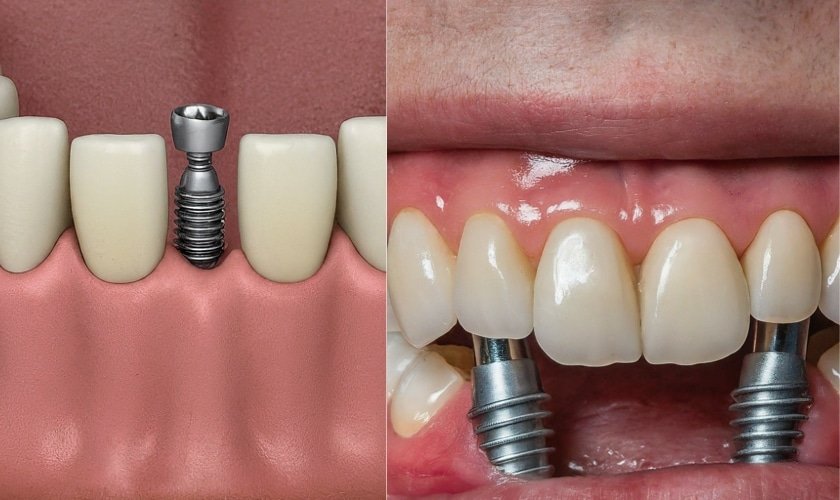Dental implants are the gold standard for replacing missing teeth. They not only look and function like natural teeth but also help preserve the jawbone and prevent facial collapse. However, many patients are unsure of what the dental implant process entails.
In this article, we’ll walk you through each phase of the dental implant journey — before, during, and after — so you know exactly what to expect and can feel confident in your decision.
What Is a Dental Implant?
A dental implant is a titanium post surgically placed into the jawbone to serve as an artificial tooth root. Once healed, a crown, bridge, or denture is attached to restore aesthetics and function. With proper care, implants can last decades or even a lifetime.
Before the Procedure: Evaluation and Preparation
1. Initial Consultation
Your dental implant journey begins with a comprehensive evaluation:
- Dental examination and medical history review
- Digital X-rays or 3D imaging (CBCT scan) to assess bone structure
- Discussion of your treatment goals and expectations
2. Treatment Planning
Your dentist or oral surgeon creates a personalized plan, which may include:
- Number and location of implants needed
- Type of restoration (crown, bridge, or denture)
- Need for preparatory procedures like bone grafting or sinus lifts
3. Pre-Implant Procedures (If Necessary)
Not all patients are ready for immediate implant placement. You may need:
- Tooth extraction – If a damaged or decayed tooth must be removed
- Bone grafting – To restore jawbone volume lost to tooth loss or gum disease
- Sinus lift – If implants are being placed in the upper back jaw and there’s not enough bone height
Healing from these procedures may take several weeks to a few months before implants can be placed.
During the Procedure: Implant Surgery
Dental implant surgery is typically performed in stages. Here’s what you can expect:
1. Anesthesia
Local anesthesia is commonly used, but sedation or general anesthesia may be recommended for anxious patients or complex cases.
2. Surgical Placement
A small incision is made in the gum tissue to expose the jawbone. A hole is drilled, and the titanium implant post is placed into the bone.
The gums are then stitched closed, and a healing cap may be placed over the implant.
3. Healing and Osseointegration
The implant must fuse with the surrounding bone in a process called osseointegration, which typically takes 3–6 months. During this time, the implant becomes a stable foundation for your new tooth.
Temporary restorations may be provided if the implant is in a visible area.
After the Procedure: Recovery and Final Restoration
1. Post-Operative Care
After surgery, you may experience mild:
- Swelling or bruising
- Soreness at the surgical site
- Minor bleeding
These are normal and can be managed with prescribed medications, cold compresses, and a soft-food diet.
2. Follow-Up Visits
Your dentist will monitor the healing process and ensure the implant is integrating properly. This may involve periodic X-rays and clinical assessments.
3. Abutment Placement
Once the implant has fully integrated, a small connector called an abutment is attached. This connects the implant to the final restoration. In some cases, the abutment is placed at the same time as the implant.
4. Final Restoration
After the gums have healed around the abutment, your dentist will take impressions to fabricate your custom restoration:
- Crown – For a single missing tooth
- Bridge – For multiple teeth in a row
- Implant-supported denture – For full arch tooth replacement
The final prosthetic is attached, restoring function and aesthetics.
Aftercare and Long-Term Maintenance
Dental implants have a very high success rate — up to 98% — but long-term success depends on proper care:
- Practice excellent oral hygiene – Brush twice a day and floss daily
- Attend regular dental checkups – Typically every 6 months
- Avoid smoking – Smoking impairs healing and increases implant failure risk
- Wear a nightguard if needed – Especially if you grind your teeth
With the right care, your dental implant can last 20+ years or even a lifetime.
Timeline Overview
| Stage | Estimated Time |
|---|---|
| Consultation & Planning | 1–2 weeks |
| Pre-implant Procedures | 1–6 months (if needed) |
| Implant Surgery | 1 day |
| Healing & Osseointegration | 3–6 months |
| Abutment & Crown Placement | 2–4 weeks |
| Total Duration | 4–12 months (average) |
Is the Dental Implant Procedure Painful?
Thanks to modern anesthesia and minimally invasive techniques, most patients report little to no pain during the procedure. Post-operative discomfort is usually manageable with over-the-counter or prescribed medication.
Final Thoughts
The dental implant process may take several months, but the results are worth it: a beautiful, functional smile that feels just like your natural teeth. Understanding each step of the process helps you prepare mentally, physically, and emotionally for a successful outcome.
If you’re considering dental implants, schedule a consultation with a qualified implant dentist to learn more about your options.




